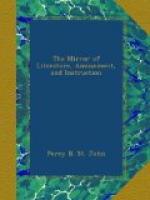When Lord Byron was praising the mental and personal qualifications of Lady Byron, I asked him how all that he now said agreed with certain sarcasms supposed to bear a reference to her, in his works. He smiled, shook his head, and said they were meant to spite and vex her, when he was wounded and irritated at her refusing to receive or answer his letters; that he was not sincere in his implied censures, and that he was sorry he had written them; but notwithstanding this regret, and all his good resolutions to avoid similar sins, he might on renewed provocation recur to the same vengeance, though he allowed it was petty and unworthy of him. Lord Byron speaks of his sister, Mrs. Leigh, constantly, and always with strong expressions of affection; he says she is the most faultless person he ever knew, and that she was his only source of consolation in his troubles on the separation.
Byron is a great talker, his flippancy ceases in a tete-a-tete, and he becomes sententious, abandoning himself to the subject and seeming to think aloud, though his language has the appearance of stiffness, and is quite opposed to the trifling chit-chat that he enters into when in general society. I attribute this to his having lived so much alone, as also to the desire he now professes of applying himself to prose writing. He affects a sort of Johnsonian tone, likes very much to be listened to, and seems to observe the effect he produces on his hearer. In mixed society his ambition is to appear the man of fashion, he adopts a light tone of badinage and persiflage that does not sit gracefully on him, but is always anxious to turn the subject to his own personal affairs, or feelings, which are either lamented with an air of melancholy, or dwelt on with playful ridicule, according to the humour he happens to be in.
Byron has remarkable penetration in discovering the characters of those around him, and he piques himself extremely on it: he also thinks he has fathomed the recesses of his own mind; but he is mistaken: with much that is little (which he suspects) in his character, there is much that is great, that he does not give himself credit for: his first impulses are always good, but his temper, which is impatient, prevents his acting on the cool dictates of reason; and it appears to me, that in judging himself, Byron mistakes temper for character, and takes the ebullitions of the first, for the indications of the nature of the second. He declares, that in addition to his other failings, avarice is now established. This new vice, like all the others, he attributes to himself, he talks of as one would name those of an acquaintance, in a sort of deprecating, yet half mocking tone; as much as to say, you see I know all my faults better than you do, though I don’t choose to correct them: indeed, it has often occurred to me, that he brings forward his defects, as if in anticipation of some one else exposing them, which he would not like; as though he affects the contrary, he is jealous of being found fault with, and shows it in a thousand ways.




